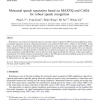Free Online Productivity Tools
i2Speak
i2Symbol
i2OCR
iTex2Img
iWeb2Print
iWeb2Shot
i2Type
iPdf2Split
iPdf2Merge
i2Bopomofo
i2Arabic
i2Style
i2Image
i2PDF
iLatex2Rtf
Sci2ools
CSL
2010
Springer
2010
Springer
Monaural speech separation based on MAXVQ and CASA for robust speech recognition
Robustness is one of the most important topics for automatic speech recognition (ASR) in practical applications. Monaural speech separation based on computational auditory scene analysis (CASA) offers a solution to this problem. In this paper, a novel system is presented to separate the monaural speech of two talkers. Gaussian mixture models (GMMs) and vector quantizers (VQs) are used to learn the grouping cues on isolated clean data for each speaker. Given an utterance, speaker identification is firstly performed to identify the two speakers presented in the utterance, then the factorial-max vector quantization model (MAXVQ) is used to infer the mask signals and finally the utterance of the target speaker is resynthesized in the CASA framework. Recognition results on the 2006 speech separation challenge corpus prove that this proposed system can improve the robustness of ASR significantly.
Automated Reasoning | Computational Auditory Scene Analysis | CSL 2010 | Monaural Speech | Utterance |
Related Content
| Added | 09 Dec 2010 |
| Updated | 09 Dec 2010 |
| Type | Journal |
| Year | 2010 |
| Where | CSL |
| Authors | Peng Li, Yong Guan, Shijin Wang, Bo Xu, Wenju Liu |
Comments (0)

